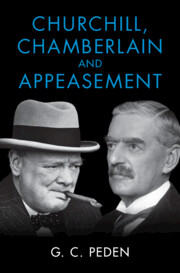Book contents
- Churchill, Chamberlain and Appeasement
- Churchill, Chamberlain and Appeasement
- Copyright page
- Contents
- Figures
- Tables
- Acknowledgements
- Abbreviations
- Introduction
- 1 Churchill, Chamberlain and Historians
- 2 Personalities and Policymaking
- 3 Britain and the Balance of Power
- 4 The Darkening Scene
- 5 The Ethiopian and Rhineland Crises
- 6 Chamberlain Takes Charge
- 7 From the Anschluss to Munich
- 8 From Munich to Prague
- 9 Deterrence by Guarantee
- 10 The Test of War
- 11 Counterfactuals and Conclusions
- Notes
- Bibliography
- Index
10 - The Test of War
Published online by Cambridge University Press: 11 November 2022
- Churchill, Chamberlain and Appeasement
- Churchill, Chamberlain and Appeasement
- Copyright page
- Contents
- Figures
- Tables
- Acknowledgements
- Abbreviations
- Introduction
- 1 Churchill, Chamberlain and Historians
- 2 Personalities and Policymaking
- 3 Britain and the Balance of Power
- 4 The Darkening Scene
- 5 The Ethiopian and Rhineland Crises
- 6 Chamberlain Takes Charge
- 7 From the Anschluss to Munich
- 8 From Munich to Prague
- 9 Deterrence by Guarantee
- 10 The Test of War
- 11 Counterfactuals and Conclusions
- Notes
- Bibliography
- Index
Summary
Some historians have seen continuity between appeasement and Chamberlain’s passive strategy in the Phoney War, but the evidence presented here is that he was not anxious to make peace. Churchill and Chamberlain initially agreed it was best to stand on the defensive while blockade weakened Germany, but their views diverged as Churchill looked for ways to take the offensive against Germany. Churchill was largely responsible for the Allied defeat in Norway but it was Chamberlain who paid the political price, his resignation being a necessary step to persuade the Labour Party to agree to enter a national government. However, Chamberlain loyally served Churchill when the latter became prime minister. In particular, Chamberlain supported Churchill’s policy of fighting on even when France looked for a way out of the war. The forces that the Chamberlain government had created, although deficient in a number of respects, stood the test of war reasonably well. However, pre-war concerns about the necessity of American economic support and British strategic overstretch proved to be well founded, as was demonstrated by the collapse of British power in the Far East. Moreover, even in victory Britain was unable to exercise effective influence in Central Europe.
- Type
- Chapter
- Information
- Churchill, Chamberlain and Appeasement , pp. 280 - 304Publisher: Cambridge University PressPrint publication year: 2022

